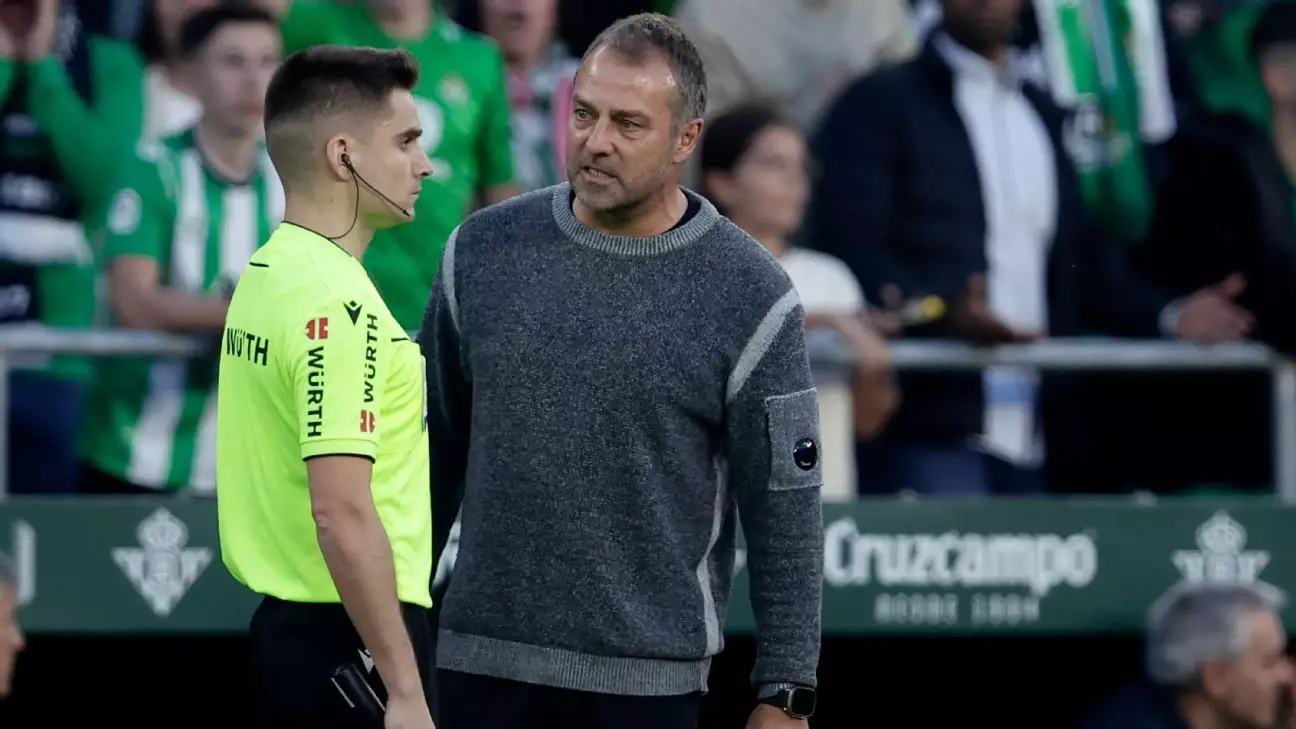In the high-stakes environment of professional football, emotions can run high, often leading to spontaneous reactions that may have consequences for both players and coaching staff. This brings us to the recent incident involving Barcelona’s coach, Hansi Flick, who faced a two-game touchline ban following his red card during a tense match against Real Betis. In a sport where precision and control are paramount, Flick’s admission of needing to improve his emotional control highlights a critical aspect of coaching—self-regulation that aligns with leadership and team dynamics.
The incident occurred in the 66th minute of Barcelona’s match against Real Betis, where Flick’s animated protests over a penalty decision awarded to the home side resulted in his expulsion from the sidelines. Such disputes are not uncommon in football, where passion can often overshadow rational thought momentarily. While Flick denied that his outburst was directed at the referee personally, the repercussions of his actions—namely the suspension from upcoming matches—serve as a reminder of the delicate balance coaches must maintain under pressure. Flick’s situation is illustrative of a broader theme in sports: the necessity for coaches to embody emotional intelligence, not just to inspire their players but to uphold the integrity of the game.
In the wake of his red card, Flick openly acknowledged the need for personal growth, stating, “I have to improve my control of my emotions.” His willingness to accept responsibility emphasizes an essential trait of effective leaders: the capacity to reflect on one’s actions and glean lessons from them. Rather than deflecting blame or minimizing the impact of his emotional reaction, Flick’s candid approach underlines a critical leadership principle—those in charge must model behavior that aligns with the values they wish to instill within their teams.
This aspect is crucial as it not only affects their managerial style but also sets the tone for player conduct. When a coach demonstrates acceptance and introspection, it fosters a similar attitude within the team, encouraging players to take ownership of their actions on and off the pitch.
A Temporary Step Back: Impact on the Team
Flick’s suspension meant that assistant coach Marcus Sorg would take over during his absence. This scenario raises interesting questions about team dynamics and the role of assistants in maintaining continuity amidst leadership disruptions. Sorg’s experience and knowledge were expected to guide the team effectively; however, it also emphasizes the intrinsic value of a head coach’s presence on match day. The strategies and emotional insights from the head coach during games are difficult to replicate, which can create challenges in maintaining the team’s momentum.
As Barcelona heads into critical fixtures, including a match against Leganés and another versus Atlético Madrid, the focus on reclaiming form becomes even more pressing. The team’s recent performance in the Champions League, coupled with the return of key players like Ronald Araújo from injury, indicates that their resilience remains intact, but the leadership dynamic will inevitably shift with Flick’s absence.
Looking Forward: The Importance of Emotional Control
As Barcelona prepares for the upcoming matches, Flick’s reflections serve as a beacon for all involved in high-pressure sports environments. The emphasis on emotional control is not merely a personal endeavor; it is foundational to a team’s success. Coaches, players, and personnel must cultivate the ability to navigate intense emotions, showcasing discipline that translates into performance.
Furthermore, as Flick pointed out, the expectations of fairness and consistency from referees are also part of the broader conversation. While human errors are a component of the game, both coaches and players must focus on what they can control—namely their responses to those decisions.
Hansi Flick’s experience may serve as a cautionary tale but also a learning opportunity for professionals navigating the challenges of competitive sports. His commitment to improving his emotional responses and accepting responsibility resonates well beyond the confines of football. In a world where leadership is defined by more than just tactical acumen, the ability to self-reflect and lead with integrity becomes essential. As Barcelona looks to solidify its position in La Liga, Flick’s journey toward mastering his emotions will undoubtedly shape the team’s path forward.

Leave a Reply